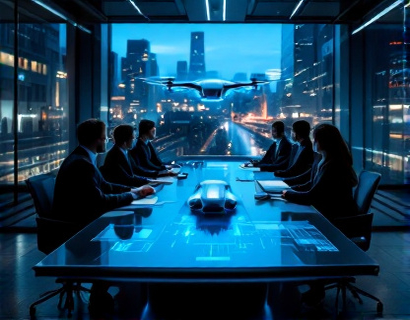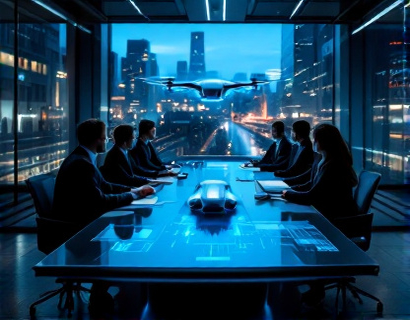AI-Powered Agent Revolutionizes Aeronautics: Streamlining Operations and Enhancing Decision-Making for Industry Professionals
The aeronautics industry, a cornerstone of global transportation and commerce, is undergoing a transformative shift powered by artificial intelligence (AI). The integration of AI agents into aeronautics operations is revolutionizing the way businesses manage their day-to-day activities, optimize resources, and make strategic decisions. This article delves into the profound impact of intelligent agents in the aeronautics sector, exploring how these technologies streamline operations, boost efficiency, and provide tailored insights to address the industry's unique challenges. For professionals and businesses seeking to leverage AI for sustainable growth and a competitive edge, understanding the role of AI agents is crucial.
Enhancing Operational Efficiency
One of the most significant benefits of AI-powered agents in aeronautics is their ability to streamline operations. Traditional aeronautics operations involve a complex web of tasks, from flight scheduling and maintenance management to cargo handling and security checks. These processes are often manual, time-consuming, and prone to human error. AI agents, equipped with advanced algorithms and machine learning capabilities, can automate these tasks with precision and speed.
For instance, AI agents can optimize flight schedules by analyzing real-time data on weather conditions, air traffic, and aircraft availability. This ensures that flights are scheduled efficiently, reducing delays and improving overall operational flow. Similarly, AI can manage maintenance schedules by predicting equipment failures before they occur, thereby minimizing downtime and maintenance costs. By automating routine tasks, AI agents allow human staff to focus on more strategic and value-added activities.
Improving Decision-Making
Decision-making in the aeronautics industry is critical and often complex, involving multiple stakeholders and vast amounts of data. AI agents enhance this process by providing actionable insights derived from comprehensive data analysis. These insights can range from predictive maintenance recommendations to optimizing supply chain logistics.
For example, AI can analyze historical flight data to identify patterns and trends that human analysts might miss. This can lead to more informed decisions regarding route planning, fuel consumption, and load optimization. Additionally, AI agents can simulate various scenarios to forecast the impact of different decisions, allowing aeronautics professionals to choose the best course of action with confidence. This data-driven approach not only improves decision quality but also accelerates the decision-making process.
Tailored Insights for Unique Challenges
The aeronautics sector faces a multitude of unique challenges, from regulatory compliance to environmental sustainability. AI agents are adept at addressing these challenges by providing tailored insights and solutions. For regulatory compliance, AI can monitor and analyze changes in aviation regulations across different regions, ensuring that operations remain compliant and up-to-date. This is particularly important given the stringent and frequently changing nature of aeronautics regulations.
Environmental sustainability is another critical area where AI can make a significant impact. AI agents can optimize flight paths to reduce fuel consumption and emissions, contributing to the industry's efforts to lower its carbon footprint. By analyzing data on aircraft performance, weather conditions, and air traffic, AI can suggest the most efficient routes and altitudes, thereby minimizing environmental impact. This not only helps in meeting regulatory requirements but also aligns with the growing consumer demand for sustainable travel options.
Enhancing Safety and Security
Safety and security are paramount in the aeronautics industry, and AI agents play a crucial role in enhancing these aspects. AI can process vast amounts of data from various sources, including sensors, surveillance systems, and security logs, to detect potential threats and anomalies in real-time. This proactive approach to safety and security can help prevent incidents and ensure the smooth operation of aeronautics facilities.
For example, AI-powered surveillance systems can monitor airport premises and detect suspicious activities, alerting security personnel immediately. Similarly, AI can analyze flight data to identify patterns that may indicate mechanical issues or other safety concerns, enabling timely maintenance and preventing accidents. By integrating AI into safety and security protocols, aeronautics organizations can create a more secure and reliable environment for passengers and staff.
Optimizing Supply Chain Management
Supply chain management is a critical component of aeronautics operations, involving the procurement, storage, and distribution of various materials and components. AI agents can significantly optimize this process by providing real-time visibility and predictive analytics. AI can track inventory levels, forecast demand, and automate procurement processes, ensuring that the right materials are available at the right time and place.
For instance, AI can analyze historical sales data and market trends to predict future demand for specific parts or supplies. This allows aeronautics companies to maintain optimal inventory levels, reducing excess stock and associated costs. Additionally, AI can identify potential supply chain disruptions and suggest alternative sourcing options, ensuring continuity and resilience. By streamlining supply chain management, AI agents help aeronautics businesses operate more efficiently and cost-effectively.
Personalized Customer Experiences
The aeronautics industry is not just about operations and logistics; it also involves providing exceptional customer experiences. AI agents can play a pivotal role in enhancing customer service by offering personalized experiences tailored to individual preferences and needs. From personalized travel recommendations to seamless check-in and boarding processes, AI can transform the customer journey.
For example, AI-powered chatbots can assist passengers with queries, provide real-time flight updates, and offer personalized travel advice. These chatbots can operate 24/7, ensuring that customer support is always available. Additionally, AI can analyze customer data to identify preferences and behaviors, enabling airlines to offer targeted promotions and services. This level of personalization not only improves customer satisfaction but also fosters loyalty and repeat business.
Challenges and Considerations
While the benefits of AI agents in aeronautics are substantial, there are also challenges and considerations that need to be addressed. One of the primary concerns is data privacy and security. Aeronautics operations involve handling sensitive information, and ensuring the security of this data is paramount. Organizations must implement robust cybersecurity measures and comply with data protection regulations to safeguard against breaches and maintain trust.
Another challenge is the integration of AI systems with existing infrastructure. Many aeronautics organizations have legacy systems that may not be compatible with AI technologies. Retrofitting these systems or developing new integrations can be complex and costly. However, the long-term benefits of AI adoption far outweigh these initial challenges, as the efficiency gains and insights provided by AI agents are invaluable.
Future Prospects
The future of AI in aeronautics is promising, with ongoing advancements likely to bring even more innovative solutions. As AI technologies continue to evolve, we can expect to see more sophisticated applications in areas such as autonomous aircraft, advanced predictive maintenance, and intelligent ground operations. The collaboration between human experts and AI agents will become increasingly seamless, leading to more efficient and effective aeronautics operations.
Moreover, the industry's focus on sustainability will likely drive further AI innovations aimed at reducing environmental impact. AI will continue to play a crucial role in optimizing fuel consumption, reducing emissions, and promoting eco-friendly practices. As the aeronautics industry strives to meet global sustainability goals, AI will be an indispensable tool in achieving these objectives.
In conclusion, AI-powered agents are revolutionizing the aeronautics industry by streamlining operations, enhancing decision-making, and providing tailored insights. These technologies offer significant benefits in terms of efficiency, safety, and customer experience, making them an essential tool for businesses aiming to stay competitive in a dynamic market. By embracing AI, aeronautics professionals can unlock new possibilities and drive sustainable growth in the years to come.










































